Mark Halliday, judge for the journal’s annual poetry contest, describes the winning poems as “ready to…confront contradictions,” “avoid dumb enthusiasm,” and provide “neatly managed endings,” which serves equally well to describe Fugue’s editorial approach, and it’s one of the reasons I’ve always liked the magazine. I appreciate Halliday’s winning choices, poems by Lisa Bellamy, David J. Corbett, and Carol Louise Munn, three distinctly different examples of what it takes to make a poem, but all “strikingly alive,” as Halliday says, and all more emotionally charged and more satisfying than they appear on a first reading. These poems tell stories more moving and more complex than their language, at first, seems to imply. Bellamy, in particular, is both clever and tender, a combination of tones that can be difficult to pull off. Continue reading “Fugue – Summer-Fall 2008”
NewPages Blog
At the NewPages Blog readers and writers can catch up with their favorite literary and alternative magazines, independent and university presses, creative writing programs, and writing and literary events. Find new books, new issue announcements, contest winners, and so much more!
Fugue – Summer-Fall 2008
Spread the word!
Green Mountains Review – 2009
The theme of this all-fiction issue is shame and glory, “which seemed a marvelously arbitrary way to come across good stories,” writes Leslie Daniels in her introduction to the issue. “As writers, shame set us wildly in motion. And glory is . . . transformation, the alchemy involved in making art,” she concludes. Continue reading “Green Mountains Review – 2009”
Spread the word!
J Journal – Fall 2008
J Journal takes a journey to the dark side of humankind – the criminal side, the enforcement side, to those who have been brutalized, taken advantage of…it uses literature to pose “questions of justice, directly and tangentially.” Each poem, each short story brings a situation laden with irony, and leaves it unresolved, leaving the reader to search within, find the discordant inner chord that has been struck and bring it back into tune. Continue reading “J Journal – Fall 2008”
Spread the word!
Mid-American Review – Spring 2009
The annual Fineline Competition issue is always one of my favorites. The contest is open to entries of prose poetry, sudden fiction or non-fiction, or other “literary work that defies classification” (500 words or less). There’s a kind of freedom in the “sudden” form that seems to bring out the best in writers of all types. This year’s first-place winner is MFA student Ryan Teitman who creates a little museum of oddities, “The Cabinet of Things Swallowed,” that ends in a surprise or, more accurately, in the promise of a surprise. It’s the sense of promise that I appreciate most in these short works. Take, for example, the start of J.L. Conrad’s “Meanwhile,” one of the Editor’s Choice winners: “My dreams inscribe for me a world in which.” Or Editor’s Choice winner Alan Michael Parker’s opening line in “Our New System of Government”: “We believe we were misinformed.” The editors received nearly 2,000 submissions for the contest. I’m clearly not the only one who appreciates the form. Continue reading “Mid-American Review – Spring 2009”
Spread the word!
Naugatuck River Review – Winter 2009
Starting a new publication, especially “in times like these” (TM), is a cause for congratulation, so here’s celebrating the debut of Naugatuck River Review, “a journal of narrative poetry that sings.” (Shouldn’t all poetry?) The “narrative” label may bring to mind first person nature encounters and bittersweet childhood memories, and NRR contains its share. The real pleasures, though, are the memorable characters, the people whose lives show up in small glimpses between the lines. We meet a sawmill worker whose retirement ceremony belies his rough-and-tumble life, a bar patron who learns to resist being treated as an object and authors her own adventure, and a cross dresser who tries too hard to impress. Continue reading “Naugatuck River Review – Winter 2009”
Spread the word!
The Ne’er-Do-Well – 2009
More props are in order for the inaugural issue of this Portland prose journal. The Ne’er-Do-Well carries itself like a zine, an enfant terrible sneering at the establishment as all rejected writers in tiny presses are wont to do. Founder Sheila Ashdown explains that her intention was to encourage writers struggling with doubt. To keep writing, she says, “requires a high threshold for psychic pain and awkward conversation.” Continue reading “The Ne’er-Do-Well – 2009”
Spread the word!
Notre Dame Review – Winter/Spring 2009
This issue’s theme is “bridges and views,” introduced by a stunning and unusual cover photo that merges beautifully the concept of bridge and view – the relationship of structure to perspective. The image does not have the appearance of stock photography, though I was unable to find a reference to the photographer. These are, of course, rich, provocative, and perhaps even favorite topics for artists from all disciplines and genres. Continue reading “Notre Dame Review – Winter/Spring 2009”
Spread the word!
Quarter After Eight – 2009
Quarter After Eight publishes prose-poems, short-short fictions, essays in-brief, etc., all of which must be contained within 500 words or less. The highlighted criterion encourages an “innovative address to the prose form…dedicated to blurring the traditional lines of prose and verse.” This issue features 28 short pieces including the 2008 Robert J. DeMott Short Prose Contest winners, with First Place going to Cynthia Reeves for “Naming the Dead.” As stated in a preface by contest judge Sean Thomas Dougherty, Reeves manages “In barely a page…[to] offer us [an] elegy for the loss of a friend, the gaining of sexual knowledge, and the subsequent hurt that follows years later through the ghost of memory.” “Naming the Dead” is so beautifully rendered it’s difficult to decide if its lines should be quoted in prose or verse, such as in the following: Continue reading “Quarter After Eight – 2009”
Spread the word!
NewPages Updates :: Contest Pages & YA Page
I’ve been updating! The Writing Contests pages have a number of new entries – click by and take a look.
NewPages lists *quality* contests on our site. These are contests sponsored by or connected with publications, presses, and colleges/universities listed in our guides. If you find incorrect information, a missing link, or have a contest you would like considered for listing please let me know.
Should you have a problem with a contest we list, notify me immediately. Contest sponsors who behave badly will promptly be removed.
Writing Contests
For individual works of all types.
Book Contests
For full-length manuscripts as well as already published books.
There is a separate listing for contests of interest to Young Authors (K – early college). This also includes links to YA publications and information about how to submit works as well as avoiding contest scams: New Pages Young Authors Guide
Spread the word!
DOXA FIlm Fest
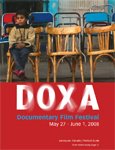 DOXA
DOXA
Documentary Film Festival
Vancouver, CA
May 22nd – 31st, 2009
DOXA is presented by the Documentary Media Society, a Vancouver based non-profit, charitable society (incorporated in 1998) devoted to presenting independent and innovative documentaries to Vancouver audiences. The society exists to educate the public about documentary film as an art form through DOXA – a curated and juried festival comprised of public screenings, workshops, panel discussions and public forums.
Spread the word!
Free Mags for Teachers :: Geist
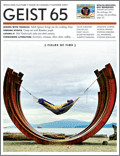 The Goods
The Goods
“Geist is delivering the best Canadian writing to classrooms from Tatamagouche to Victoria, from high school to grad school, from creative writing to English composition. Four times a year we publish fiction, life writing, essays, poetry, comix, rants, photo essays and unclassifiable dispatches — a cornucopia of genres and styles for teachers and students of writing.”
The Deal
“We send you a free class set of Geist.
We post free lesson plans that you can use in the classroom.
That’s it! No strings, no sales, no spam.”
The Agenda
“Geist is always looking for new writers and readers.
Writing teachers are always looking for new teaching ideas and opportunities for emerging writers.
Geist in the Classroom puts us together.”
Spread the word!
Film :: War Rug
“War Rug is a work of documentary poetics in the form of a book length poem. Multiple interwoven narratives explore life within zones of conflict as viewed through the lens of current warfare. The narratives range from passages inspired by journal entries, firsthand accounts, and news reports to poetic constructs collaged from military doctrine, Freedom of Information Act released government documents (like CIA interrogation manuals, and detainee autopsy reports), and numerous other sources.” (Poet, translator, and new media artist Francesco Levato is the executive director of The Poetry Center of Chicago.)
Spread the word!
Allied Media Conference
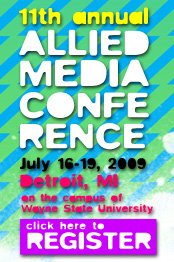 11th Allied Media Conference
11th Allied Media Conference
“We Are Ready New: Media and creativity to transform our selves and our world”
July 16-19, 2009
Detroit, Michigan
The 11th AMC will advance our visions for a just and creative world. It will be a laboratory for media-based solutions to the matrix of life-threatening problems we face. For the past 10 years, we have evolved our definition of media, and the role it can play in our lives – from zines to video-blogging to breakdancing, to communicating solidarity and creating justice. Each conference builds off the previous one and plants the seeds for the next. Ideas and relationships evolve year-round, incorporating new networks of media-makers and social justice organizers. The 2009 AMC will draw strength from our converging movements to face the challenges and opportunities of our current moment.
Spread the word!
NEA Overlooks Narrative Nonfiction
And Lee Gutkind has something to say about it on The Voice of Creative Nonfiction.
Spread the word!
Scholarly Journals :: Works and Days
 Published by the English Department at the Indiana University of Pennsylvania, Works and Days provides a scholarly forum for the exploration of problems in cultural studies, pedagogy, and institutional critique, especially as they are impacted by the transition from print to electronic environments. Each issue of the journal is organized around specific inquiries conducted as shared disciplinary or postdisciplinary research projects. Works and Days aims to serve not only as a forum for collaborative research and teaching, but also as an environment in which mutual inquiries may flourish.
Published by the English Department at the Indiana University of Pennsylvania, Works and Days provides a scholarly forum for the exploration of problems in cultural studies, pedagogy, and institutional critique, especially as they are impacted by the transition from print to electronic environments. Each issue of the journal is organized around specific inquiries conducted as shared disciplinary or postdisciplinary research projects. Works and Days aims to serve not only as a forum for collaborative research and teaching, but also as an environment in which mutual inquiries may flourish.
Issues include:
Academic Freedom and Intellectual Activism in the Post-9/11 University
v26-27, 2008-2009
The Society for Critical Exchange–Phase 1: 1975-1988
v25, 2007
Intellectual Intersections: Ethnic and Racial Crossings
v24, 2006
Richard Ohmann: A Retrospective
v23, 2005
Capitalizing on Play: The Politics of Computer Gaming
v22, 2004
Spread the word!
Who’s New at the Academy?
The American Academy of Arts and Letters will hold its annual induction and award ceremony on Wednesday, May 20, 2009. President of the Academy, McClatchy stated, “The Academy is proud to welcome to its ranks these distinguished new members. It’s an eclectic group of exceptional individuals—each a pioneer of the imagination and an artist of resplendent gifts and achievements.”
Nine members will be inducted into the 250-person organization: artist Judy Pfaff and architect Tod Williams; writers T. Coraghessan Boyle, Jorie Graham, Yusef Komunyakaa, and Richard Price; composers Stephen Hartke, Frederic Rzewski, and Augusta Read Thomas.
Academician Louise Glück will deliver the Blashfield Foundation Address, titled “American Originality.” An exhibition of art, architecture, books, and manuscripts by new members and recipients of awards will be on view at the Academy’s galleries from May 21 to June 14, 2009.
Spread the word!
Teachers on Twitter
Laura Walker has some tips for educators getting started on and using Twitter for professional development and networking, as well as regular Twitter updates on her blog.
Spread the word!
They’re Here!
Spread the word!
National Magazine Award Finalists
The American Society of Magazine Editors has announced the 2009 National Magazine Awards Finalists. Congratulations to literary magazines Antioch, The Virginia Quarterly, The American Scholar, and The Paris Review who made the list!
Spread the word!
Passings :: James D. Houston
 James D. Houston, author of Snow Mountain Passage, Continental Drift and, with his wife, Farewell to Manzanar, died on April 16 as a result of complications from cancer. He was 75.
James D. Houston, author of Snow Mountain Passage, Continental Drift and, with his wife, Farewell to Manzanar, died on April 16 as a result of complications from cancer. He was 75.
Spread the word!
Comics Archive Online
New at the University of Nebraska-Lincoln library: Government Comics Collection. With nearly 200 entries, there’s a wide range of content – from Fighting Apartheid to The True Story of Smokey the Bear. All are available full-text pdf.
Spread the word!
Forgotten Pulitzers
Before adding a new author to the list of winners, AbeBooks has compiled a list of “forgotten winners of the Pulitzer Prize for Fiction and the Pulitzer Prize for the Novel as the award was known prior to 1948.” Winning does not secure lasting fame, or even books that can still be found on the shelf, as the price of some of these out-of-print editions will show.
Spread the word!
New Lit Mag Reviews Posted
NewPages Literary Magazine Reviews for April 18 include The Antioch Review :: The Chaffin Journal :: ChiZine :: Eclectica :: The Farallon Review :: Journal of Ordinary Thought :: Manoa :: The Missouri Review :: storySouth :: The Sun :: Tuesday
Spread the word!
Novelists Need to Write More in the Now
Amanda Craig argues that “Contemporary novelists are so busy writing about the past, they’re neglecting the times they live in.” Her article “Stuck in the past: Why is modern literature obsessed with history?” in The Independent considers the responsibility of novelists to represent and comment on their own time, the difficulty of the task, and the risks associated with public response that need to stop being avoided.
Spread the word!
Passings :: Eve Sedgwick
 Educator, Author Eve Kosofsky Sedgwick Dies at 58
Educator, Author Eve Kosofsky Sedgwick Dies at 58
By Advocate Writer Michelle Garcia
Eve Kosofsky Sedgwick, a prominent theorist who is often cited as one of the founders of queer theory, died on April 12. She was 58.
Sedgwick was reportedly diagnosed with breast cancer in 1991, prompting her book A Dialogue on Love. Sedgwick taught English at several institutions including Boston University; the University of California, Berkeley; and Duke University, where she was a Newman Ivey White Professor of English.
Sedgwick has written many books on gender and sexual orientation, including Between Men: English Literature and Male Homosocial Desire; Epistemology of the Closet; and Tendencies.
Spread the word!
Documentary :: Ferlinghetti
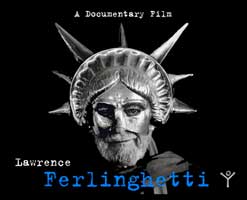 Lawrence Ferlinghetti turned 90 last month, and this month will see the premiere of a documentary about Ferlinghetti’s life and work on April 28 at the San Francisco International Film Festival.
Lawrence Ferlinghetti turned 90 last month, and this month will see the premiere of a documentary about Ferlinghetti’s life and work on April 28 at the San Francisco International Film Festival.
Director Christopher Felver crafts an incisive, sharply wrought portrait that reveals Ferlinghetti’s true role as catalyst for numerous literary careers and for the Beat movement itself. The film features archival photographs and historical footage, with appearances by Allen Ginsberg, Michael McClure, Billy Collins, Dennis Hopper, Robert Scheer, Dave Eggers, and Pulitzer Prize winner Gary Snyder. The appearance of numerous other prominent figures from the literary, political, and art community further underscores the enormous social impact Ferlinghetti’s legacy continues to have on the American cultural scene.
Spread the word!
Book Cover Banquet
With (currently) over 1000 images, The Book Cover Archive presents “An Archive of Book Cover Designs and Designers for the Purpose of Appreciation and Categorization.” You can browse all, or refine to browsing to full alpha lists of designers, titles, authors, art directors, photographers, illustrators, genres, publication date and publishers. Thanks for the feast goes to Ben Pieratt and Eric Jacobsen who edit and maintain The Book Cover Archive.
Spread the word!
WoC Media Collective: SPEAK!
SPEAK! Women of Color Media Collective is a netroots coalition of media-makers interested in strengthening our communities through truth-telling, media justice and the creation of a network of women of color media makers.
SPEAK! members blend together personal experience with an intersectional [includes everyone] multi-issue feminist perspective. SPEAK! members believe in media that is for our communities, by our communities. The framework SPEAK! uses is the one created by earlier feminists of color: a life-long commitment to addressing interlocking forms of oppression by creating radical transformative relationships to each other and the world.
In addition to a zine of poetry, lyrics, and art, SPEAK! has produced a CD and encourages “Listening Parties” – including a PDF of discussion questions and related activities for each of the CD tracks – great for community reading groups and classroom use.
This is the track list for the CD:
1. Why Do You Speak? – Adele Nieves
2. Something Else to Be – Sydette Harry (Black Amazon)
3. Slip – Maegan “La Mamita Mala” Ortiz
4. We Will Never Forget – Nadia Abou-Karr
5. When I Speak – Aaminah Hernández
6. We Are the Daughters – Lisa Factora-Borchers
7. Severance – Sylvia Peay
8. Tears and Beauty – Cripchick
9. An Archaelogy of Freedom – Alexis Pauline Gumbs
10. My Cats – Baby BFP
11. Reality – Noemi Martinez
12. Sin – BrownFemiPower
13. On Cartography and Dissection – E. Rose Sims
14. Genocide – Nadia Abou-Karr
15. Chaos – Fabiola Sandoval
16. Song of Solomon – Sydette Harry (Black Amazon)
17. Sequestro – Maegan “La Mamita Mala” Ortiz
18. Wishful Thinking – Alexis Pauline Gumbs
19. I Feel Pretty – E. Rose Sims and SPEAK!
20. For Those of Us… – SPEAK!
Spread the word!
The Antioch Review – Winter 2009
Poetry editor Judith Hall introduces the all poetry issue with a beautiful editorial: “Those not spent by life are privileged. A poet, reading in the evening, writing after dawn, enjoys such privileges.” A reader with this issue in her hands is privileged, too, I am happy to say. Continue reading “The Antioch Review – Winter 2009”
Spread the word!
The Chaffin Journal – 2007
If you’ve had it with glamour and cuteness in your literary diet, turn to The Chaffin Journal for the antidote. Formerly known as Scripsit, this journal from Eastern Kentucky University is all meat and potatoes. The writing frequently dwells on quotidian themes in rural and small-town locales. That means The Chaffin Journal opts for straight story and verse over risk taking. Overall, the performance is uneven, but sometimes, the lumps in the landscape provide solid, memorable art. Continue reading “The Chaffin Journal – 2007”
Spread the word!
ChiZine – January – March 2009
This ezine describes its work as “treatments of light and shade in words.” The website is dark and ominous and each quarter only three or four poems and stories appear for consumption. The editors are quite selective and have a particular style they are looking for. They also pay well: seven cents a word for a short story, which translates into $210.00 for a three thousand word narrative – a nice sum in today’s market! Continue reading “ChiZine – January – March 2009”
Spread the word!
Eclectica Magazine – January/February 2009
This magazine has been in existence since 1996, making it one of the more long lasting and consistent ezines of its kind. They seem to have very eclectic tastes in what they present to the reading public, hence, no doubt, the name. In this latest issue, there is much to choose from, including a spotlight on pop culture chronicler Chris Epting; a letter from Editor Tom Dooley; commentary; fiction; poetry; non-fiction; travel articles; reviews and interviews; and some satire. Continue reading “Eclectica Magazine – January/February 2009”
Spread the word!
The Farallon Review – 2008
Tim Foley and the other editors of The Farallon Review aim to, “share the work of writers who still believe that short fiction is a unique artform, worth writing, and worth reading.” The realistic fiction in this new journal is certainly long on imagination and features distinctive narrators. Continue reading “The Farallon Review – 2008”
Spread the word!
Journal of Ordinary Thought – Fall 2008
Chicago’s remarkable populist tradition includes a diverse range of voices, from Carl Sandburg to Gwendolyn Brooks. The Journal of Ordinary Thought is a firm product of that tradition, showcasing everyday people from the neighborhood with something to say. Some are joyfully discovering their creative potential; some are more urgent to make their opinions heard. The theme here, “Notes for a People’s Atlas of Chicago,” playfully reveals the limitations of maps in detailing the experience of lived space. Given an outline of the city, participants created their own atlases and legends. Included are maps denoting the Cubs/Sox divide, the barrage of condos being built, places to buy the best pierogies or find residences of IVAW members. Continue reading “Journal of Ordinary Thought – Fall 2008”
Spread the word!
Manoa – Winter 2008
Enduring War: Stories of What We’ve Learned is an edifying volume that is not exactly lacking in timeliness: Have war stories ever been irrelevant? But this is not a volume to be read with self-righteousness; the lessons from world conflict are never easy to swallow. As Manoa reveals, war always seems to exist on the periphery of our consciousness, something that happened “over there” or “back then.” The photographic images of Darfur refugees may not be graphic or shocking, but they do capture the feeling and pain that can easily get lost in the drone of the media. In his introduction, Editor Frank Stewart quotes the novelist Carlos Fuentes: “Literature makes real what history forgot.” The task of literature, then, is to uncover the truth that the makers of history (and war) will find unpleasant. Continue reading “Manoa – Winter 2008”
Spread the word!
The Missouri Review – Winter 2008
“A poet’s love of poetry is everything,” says Rodney Jones, interviewed in this issue by Andrew McFadyen-Ketchum. The Missouri Review editors love what they do, too – they have created something that is clearly a labor of love. Continue reading “The Missouri Review – Winter 2008”
Spread the word!
storySouth – Winter 2009
Jason Sanford, the founding editor of this literary magazine is stepping down after seven years at the helm and ceding his position to Spring Garden Press out of Greensboro, N.C. He will, however, continue to direct the wonderful and very needed Million Writers Award. As his farewell salute, he has presented a selection of the best fiction, essays, and poetry from the last seven years. Continue reading “storySouth – Winter 2009”
Spread the word!
The Sun – March 2009
I absolutely love The Sun. Without fail, in every issue I’ve ever read, there has been writing aplenty to admire. The Sun is one of the most democratic literary magazines I have ever encountered in that it celebrates and honors anyone who has something worthwhile to say. I have never read a less than stellar piece of writing in it. Edited by Sy Safransky, The Sun’s contents are always a revelation, a slap in the face reminder that brilliance and compassion are lurking everywhere. Continue reading “The Sun – March 2009”
Spread the word!
Tuesday; An Art Project – Fall 2008
The third issue (v2n1) of Tuesday; An Art Project comes in a plain, thick, yellow wrapper. Inside is the table of contents, a feature poem, short bios of the authors, editorial information, and – most importantly – cards and postcards containing the poems, prints and photographs. There are only seventeen cards, and they are all striking. Continue reading “Tuesday; An Art Project – Fall 2008”
Spread the word!
Awards :: Ruminate
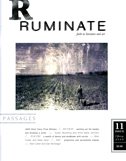 The newest issue of Ruminate (11, Spring 2009)features the magazine’s 2009 Short Story Prize winner, as selected by Brent Lott: Susan Woodring with her story “The Smallest of These.” Woodring’s story can also be read online. Anna Maria Johnson’s story “Charlie’s Arm” was the runner-up and is also included.
The newest issue of Ruminate (11, Spring 2009)features the magazine’s 2009 Short Story Prize winner, as selected by Brent Lott: Susan Woodring with her story “The Smallest of These.” Woodring’s story can also be read online. Anna Maria Johnson’s story “Charlie’s Arm” was the runner-up and is also included.
Spread the word!
Art and Politics :: Guernica
From Guernica, an online magazine of art and politics:
POETRY: Acclaimed Puerto Rican poet Rafael Acevedo explores one of our last remaining taboos–cannibalism–in two poems.
FICTION: Panamanian author Justo Arroyo answers “The Question:” Why do we pay so much for our workaday lunch–and get so little in return?
ART: In “Beaufort West,” situated along South Africa’s N1 highway, with an island prison in the middle of town, Mikhael Subotzky captures the vivid characters and poignant social landscapes.
Spread the word!
Detroit’s Media Renaissance
In addition to attracting moviemakers to the state (“Michigan will be the next film capitol of the world,” Clint Eastwood said in a recent interview following the release of his new film Gran Torino, shot in Detroit.), WireTap Magazine sees the full range of new media creativity booming in this auto-deprived town, from broadband to indie music to media arts and “allied media” projects. Can this be Michigan’s Phoenix?
Spread the word!
Artist :: Soojung Cho
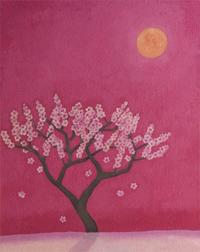 “Most frequently I paint the sky; it is a space where we can find peace; it is a space for our soul; it is a space where we can find hope.” Soojung Cho, artist
“Most frequently I paint the sky; it is a space where we can find peace; it is a space for our soul; it is a space where we can find hope.” Soojung Cho, artist
Check out Soojung Cho’s online portfolio for more beautiful, peaceful oil paintings.
Spread the word!
Zyzzyva: Textimage in Review
 The Spring 2009 issue of Zyzzyva offers readers a unique look at “textimage” with over 100 contributions in this single collection.
The Spring 2009 issue of Zyzzyva offers readers a unique look at “textimage” with over 100 contributions in this single collection.
From the Editor’s Note:
“Digital screens mash up words and pictures and videos and sound and links (to everything). The printed page segregates elements, putting them into their linear, orthogonal, rightful places.
“In this issue, we explore the spectrum of textimage, instances in which text and image collide and collude on the page-from the artist playing with that basic literary unit, the letter, to the writer sketching and doodling in his notebook.
Our take is not scholarly, but deliberately ecumenical, using examples from our pages over the past quarter century…”
Read more from Howard Junker, as well as view several of the works from this issue on Zyzzyva.
Spread the word!
Self Publish in the News
Victoria Strauss on Writer Beware Blogs! responds to the recent flurry of mainstream news articles on self-publishing, and “The Need for Balance.” Strauss notes that “articles on self-publishing often follow a similar formula” and include:
1. Pick a rare instance of self-publishing success
2. Segue to the growth of self-publishing and the great possibilities it offers for budding authors, while taking a swipe at the commercial publishing industry
3. Toss out a few random facts about self-publishing
4. Mix in some boosterish quotes from representatives of self-pub companies
5. Feature a happy self-pubbed author
6. Conclude (explicitly or by implication) that “traditional” publishing is [pick one] dead/dying/running scared
For more “balance” – WB offers highly informative page on self-publishing, which includes the pros and cons, sales statistics, issues to consider, and advice on if you decide to move forward with SP/POD, as well as further resources to help you educate yourself. Check it out here.
Spread the word!
What is Poetry For?
In Chicago, February 2009, at the annual conference of the Association of Writers and Writing Programs, the editors of Poems Out Loud asked eleven poets – Martha Serpas, Todd Boss, Molly Peacock, Major Jackson, Cole Swenson, Kim Addonizio, Kimiko Hahn, Willie Perdomo, Beth Ann Fennelly, Julie Sheehan, and Honor Moore – “What Is Poetry For?”
Spread the word!
Raise the Bridge: Ebert on O’Reilly
“Thoughts on Bill O’Reilly and Squeaky the Chicago Mouse” is a letter from Roger Ebert to Bill O’Reilly – apparently in response to O’Reilly listing the Chicago Sun Times on his ‘Wall of Shame.’ I don’t keep up with O’Reilly tit-for-tats outside of Olbermann, but this one ends with such a fitting parable that I had never heard before, it seems worth passing along. Squeaky the Chicago Mouse, indeed.
Spread the word!
Changing Lives Through Literature
“Changing Lives Through Literature (CLTL) is a program that began in Massachusetts in response to a growing need within our criminal justice system to find alternatives to incarceration. Burdened by expense and repeat offenders, our prisons can rarely give adequate attention to the needs of inmates and, thus, do little else than warehouse our criminals. Disturbed by the lack of real success by prisons to reform offenders and affect their patterns of behavior, Professor Robert Waxler and Judge Robert Kane discussed using literature as a way of reaching hardened criminals.”
Started in Massachusetts, programs have also started in Texas, Arizona, Kansas, Maine, New York, Rhode Island, and Connecticut. An adaptation of CLTL is also running strong in England. California and Illinois are interested in starting programs, and one is almost underway in Canada.
The CLTL website includes information about starting and running a similar program in your state, with sample syllabi from men’s, women’s, and juvenile programs.
Spread the word!
New Lit on the Block :: Country Dog Review
The Country Dog Review is a journal of poetry conceived and edited by Danielle Sellers. It is currently an online journal with “the hopes of becoming both an online and print journal soon.”
The first issue includes works by Jesse Bishop, Larry Bradley, Greg Alan Brownderville, Alicia Casey, Heather Cousins, Erica Dawson, Blas Falconer, Ann Fisher-Wirth, Daniel Groves, Chris Hayes, David Kirby, Nick McRae, Adam Million, Erin J. Millikin, Ren Powell, John Pursley III, Lynn Wagner, Susan Settlemyre Williams, and John Dermot Woods, as well as an interview with David Kirby.
The Country Dog Review is currently accepting submissions for its fall issue, deadline August 1st, 2009.
Spread the word!
Celebration of the Chapbook
A Celebration of the Chapbook festival calls attention to the rich history of the chapbook and highlights its essential place in poetry publishing today as a vehicle for alternative poetry projects and for emerging authors and editors to gain entry into the literary marketplace. The festival will forge a new platform for the study of the chapbook inside and outside the academy and celebrate the importance of chapbooks to America’s cultural heritage and future.
Thursday April 23rd, 2009 – Saturday April 25th, 2009
The Graduate Center, CUNY
